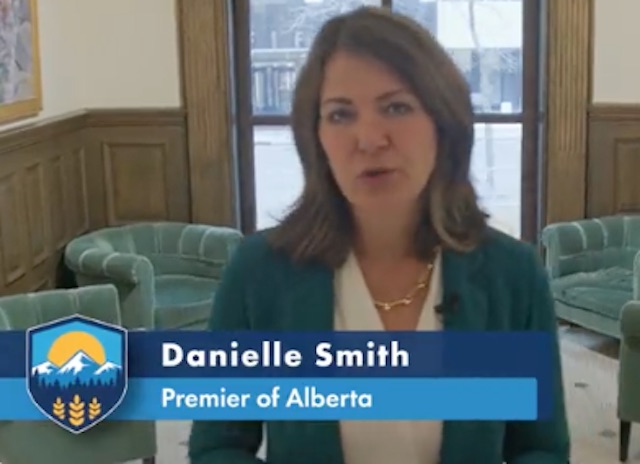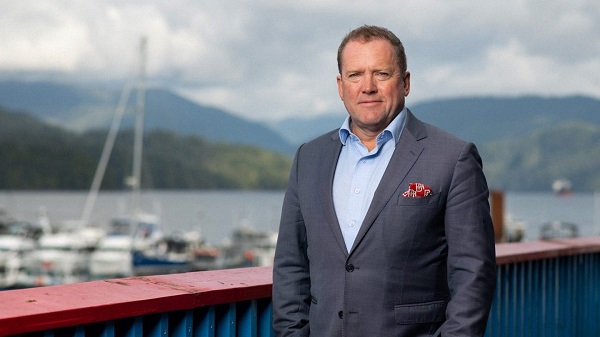Alberta
Premier Smith urges Canadians to contact their MP’s to demand reliable & affordable power

“What would happen if your power went out and it’s minus 30 outside”? This question is posed to Albertans and all Canadians by Premier Danielle Smith. Premier Smith has been chastised by the opposition NDP and supporters of Prime Minister Justin Trudeau’s plan to make Canada’s electricity grid completely carbon neutral by 2035.
Smith says Trudeau’s net zero strategy is a terrible mistake that will lead to brutal power outages while potentially quadrupling the cost of energy. Further, since wind and solar generation depends on sunlight and a good breeze, renewable energy can’t always be relied on. To make that clear Smith pointed to eight different occasions in the past year when Alberta’s electricity system nearly collapsed.
While repeating her pledge to make Alberta’s power grid carbon neutral by 2050, Smith is urging Canadians to join her in support of a more reasonable plan for energy transition.
No one in Canada should be without access to electricity, but if the feds don’t smarten up they will put all of us at risk.
Take 30 seconds and send a message to our Liberal-NDP government in Ottawa 👉https://t.co/GmBSkeaXs6 pic.twitter.com/ZwDpQ2o2nQ
— Danielle Smith (@ABDanielleSmith) October 16, 2023
From TellTheFeds.ca
No one wants blackouts.
What Canadians want is reliable & affordable power.
Ottawa’s proposed electricity regulations will make electricity unreliable & unaffordable.
THE THINGS CANADIANS COUNT ON WON’T WORK WHEN NEEDED.
Affordable electricity matters.

In addition to blackouts, current electricity rates will be double, triple or even quadruple depending on the province. And drastic changes could dismantle thriving industries that are vital parts of our provincial economies, resulting in a power grid that depends on unreliable energy.
Canada can’t afford a hasty transition.

Reliable electricity matters.
With cited cost estimates as high as $1.7 trillion*, the cost of achieving a net zero grid by 2035 will leave our power grid dependent on intermittent and unreliable sources like solar and wind.
Imagine no heat at -30°, and no power for the Internet or to charge your phone.
The federal government wants electricity demand to at least double by 2050. Tell the Feds reliable and affordable electricity matters. And ask them why they are rushing to do something by 2035 when the experts agree that it can’t feasibly be done.
* Source: Public Policy Forum, Project of the Century, July 2023
Tell the Feds what you want.
Contact your MP.
There is a better path forward. Alberta is leading the way. Together, let’s make a better plan.
Not a mandate.
Ottawa’s carbon-neutral goals can be achieved by 2050 with a lower tax and utility burden on Canadians. Changing over our electricity system in 27 years is much more practical and affordable than rushing to do it in just 12 years. Rather than being told to dismantle industries critical to Canada’s economy, Tell the Feds to work with the provinces on a plan that benefits all Canadians.
Alberta
Carney’s pipeline deal hits a wall in B.C.

This article supplied by Troy Media.
Carney’s attempt to ease Canada’s dependence on the U.S. stirs a backlash in B.C., raises Indigenous concerns and rattles his own party
The Memorandum of Understanding (MOU) between Prime Minister Mark Carney and Alberta Premier Danielle Smith has opened a political hornet’s nest, exposing deep divisions within the Liberal Party and forcing a national debate that has been avoided for years.
Carney was under mounting pressure to respond to U.S. tariffs that threaten to carve billions out of Canada’s economy. The United States buys more than 95 per cent of Canada’s oil exports, leaving the country highly exposed to U.S. policy decisions. That pressure is now driving his push for a route to the Pacific, a project that could change Canada’s economic future but also destabilize his already fragile minority government.
Carney knows the political risk. His government could fall at any time, which only raises the stakes. Even so, he has pressed ahead. The agreement with Alberta lays early groundwork for a new pipeline to the Pacific. It would expand the oil sands, ease some environmental obligations and revive a proposal industry leaders have pushed for years.
The route is far from settled, but it is expected to run to B.C.’s northern coast and open access to Asian buyers. A Pacific route would finally give Canada a direct path into Asian energy markets, where demand remains strong and prices are often higher than in the United States.
If Carney expected broad support, he did not get it, especially in British Columbia. Because B.C. is the only province with a deep-water port capable of handling large crude carriers, it is the only path a west-coast pipeline can take. The province is now the central battleground, and whether the project succeeds will depend on what happens there.
B.C. Premier David Eby criticized the lack of consultation. “It would have been good for B.C. to be at the table,” he said, warning that the project risks undermining Indigenous support for the province’s liquefied natural gas plans. He also noted that the pipeline has no private backer and no commitments from First Nations, two obstacles that have tripped up projects before.
The backlash quickly spread to Ottawa. Steven Guilbeault, the former environment minister and the most prominent environmentalist ever to serve in a federal cabinet, resigned from cabinet in direct response to the MOU. He said the proposed pipeline “would have major environmental impacts”. Green Party Leader Elizabeth May said his departure “dashes the last hope that Mark Carney is going to have a good climate record ever.”
Several B.C. Liberal MPs echoed concerns about the political cost. CBC News reported anger inside the caucus, with some MPs “seething” over the agreement and worried about losing climate-focused voters.
The voters those MPs fear may not be as opposed as they think. An October Angus Reid Institute survey found that a solid majority of Canadians support a pipeline from northern Alberta to the northwest B.C. coast. In British Columbia, support outweighs opposition by a wide margin. That challenges Eby’s claim that the project lacks public backing. Carney may have more room to manoeuvre than his critics admit.
The most significant challenge, however, comes from Indigenous leaders. British Columbia is the only province that has formally adopted the United Nations Declaration on the Rights of Indigenous Peoples (UNDRIP) into law, giving First Nations a stronger legal position in major project decisions. Court rulings over the past two decades have affirmed a duty to consult and, in some cases, accommodate Indigenous communities, giving them major influence over large projects.
A group representing Coastal First Nations in B.C. said the pipeline “will never happen”. The Union of B.C. Indian Chiefs said it is “loudly objecting” to the MOU, arguing it was drafted without involvement from coastal First Nations and does not meet consultation standards outlined in UNDRIP. “The answer is still no and always will be,” said UBCIC Grand Chief Stewart Phillip. He also said lifting the crude oil tanker ban would amount to bulldozing First Nation rights. Without Indigenous consent, the project cannot proceed, and Carney knows this is the single largest barrier he faces.
Carney’s reasoning is straightforward. The long-term danger of relying on one market outweighs the short-term turbulence created by the pipeline fight. The MOU suggests Ottawa is prepared to reconsider projects once thought politically impossible in order to protect Canada’s economic future. He is betting that doing nothing is the bigger risk.
Whether this pipeline moves forward is uncertain, and the obstacles are real. One fact, however, remains clear. Canada cannot keep betting its stability on a single market.
Toronto-based Rashid Husain Syed is a highly regarded analyst specializing in energy and politics, particularly in the Middle East. In addition to his contributions to local and international newspapers, Rashid frequently lends his expertise as a speaker at global conferences. Organizations such as the Department of Energy in Washington and the International Energy Agency in Paris have sought his insights on global energy matters.
Troy Media empowers Canadian community news outlets by providing independent, insightful analysis and commentary. Our mission is to support local media in helping Canadians stay informed and engaged by delivering reliable content that strengthens community connections and deepens understanding across the country.
Alberta
This new Canada–Alberta pipeline agreement will cost you more than you think


Canada and Alberta’s new net-zero energy deal is being promoted as progress, but it also brings rising costs. In this video, I break down the increase to Alberta’s industrial carbon price, how those costs can raise fuel, heating, and grocery prices, and why taxpayer-funded carbon-capture projects and potential pipeline delays could add even more. Here’s what this agreement could mean for Canadians.
Watch Nataliya Bankert’s latest video.
-

 National1 day ago
National1 day agoCanada Needs an Alternative to Carney’s One Man Show
-

 Alberta13 hours ago
Alberta13 hours agoThis new Canada–Alberta pipeline agreement will cost you more than you think
-

 Daily Caller1 day ago
Daily Caller1 day agoTech Mogul Gives $6 Billion To 25 Million Kids To Boost Trump Investment Accounts
-

 Business1 day ago
Business1 day agoRecent price declines don’t solve Toronto’s housing affordability crisis
-

 Automotive13 hours ago
Automotive13 hours agoPower Struggle: Governments start quietly backing away from EV mandates
-

 Energy12 hours ago
Energy12 hours agoUnceded is uncertain
-

 Business1 day ago
Business1 day agoCanada’s future prosperity runs through the northwest coast
-

 armed forces2 days ago
armed forces2 days agoGlobal Military Industrial Complex Has Never Had It So Good, New Report Finds





